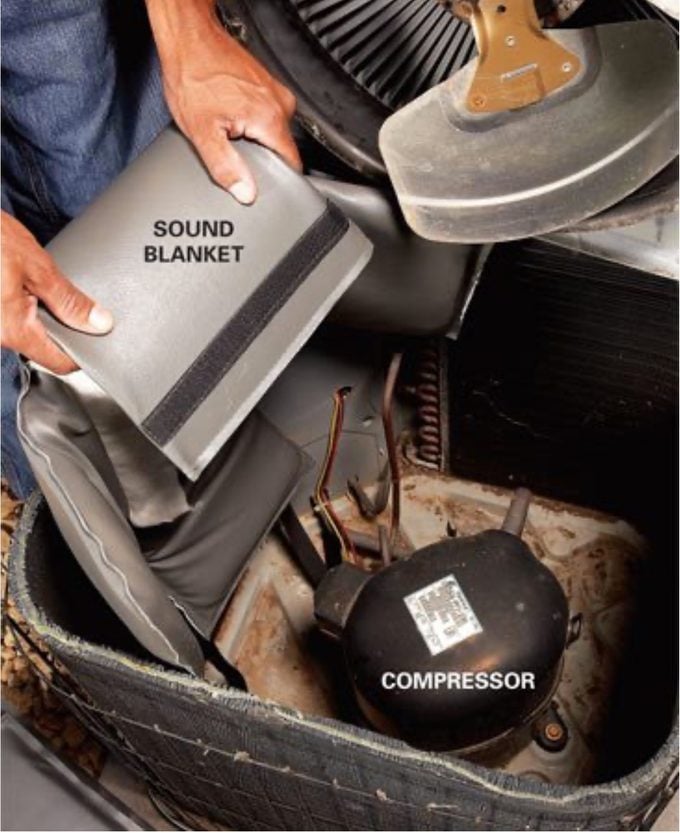When the temperature really begins to rise as it has this summer, it’s pleasant to be able to withdraw into your own space.
air conditioned
During the peak of the afternoon, when you’re trying to cool off at home, but your condenser is loudly protesting outside, finding relief from the scorching weather becomes difficult. This is particularly true if the noise suggests that the air conditioning system might be on the verge of failing completely.
Fortunately, you can often
fix a loud air conditioning unit
do it yourself instead of calling an HVAC professional, who will likely be quite booked during this season.
Below are several options to address a noisy condenser.
Inspect the Exterior of the Condenser
If you detect a consistent, periodic knocking sound coming from your air conditioner, the metal casing around the fan could have a dent or bend causing this issue. Inspect the component; you might manage to flatten the indentation sufficiently so as to stop the noise. Additionally, verify if any screws on the condenser are either loose or absent. Securing these screws or substituting those that are missing should alleviate much of the rattling produced by the system.
Checking the unit for damage and loose components should be included in your routine maintenance. This practice helps avoid major issues down the line.
extend the life
of your air conditioner.
Install a Sound Blanket
Newer versions have been designed to minimize fan noise; however, an older unit that functions well might still be quite noisy. A solution for this issue could involve installing a sound blanket.
Typically constructed with acoustic insulation along with a rubber layer, the blanket is designed to fit snugly around
the compressor
To minimize the noise, follow these steps for installation: first, remove the top panel by unscrewing it. Since the bulky fan motor is attached to this panel, ask someone to assist you by holding the panel steady as you fit the acoustic blanket over the air conditioning unit.
The blankets are safe for use and can decrease the noise emanating from the unit by up to 50 percent.
Make sure to de-energize the system entirely prior to commencing work. Disable the thermostat within your home, turn off the circuit breaker at the primary electrical panel, and remove the fuse block from the external disconnect enclosure.

Build a Sound Fence
Enclosing one side or all sides of your outdoor AC unit with a fence may help reduce noise levels. Before committing fully, try placing some plywood near the unit to see what kind of sound dampening effect this would have. Should you opt for building a fence, ensure it stands at least 3 feet away from the unit to maintain proper ventilation.
You’ll get the best attenuation of sound from a noisy air conditioner by overlapping fence boards instead of leaving gaps between them, but be sure the fencing is
far enough away
From the condenser to ensure proper airflow.
Other Air Conditioner Noises
The strategies provided here can assist with a noisy condenser unit. Nonetheless, you might hear distinct sounds emanating from your air conditioning system, including screeches, gurgles, or clicks. Should these noises occur, they might signify larger issues, and it would be wise to have an expert inspect your unit. This professional can determine if particular components require repair or replacement or if upgrading the entire unit is necessary.
Remember to keep your
air conditioner clean
A dirty and clogged condenser will not function efficiently and may cause more significant issues.
FAQs
Could a clogged air filter make my air conditioner loud?
Certainly, even though it might require some patience. When the filter is clogged, it hinders airflow, causing the blower to operate more strenuously. Over time, this increased strain can lead to loose screws in the blower wheel or worn-out bearings in the compressor, ultimately making your air conditioning unit quite noisy.
What can be done when your air conditioner produces a grinding sound?
A lot of sounds can point to small issues, however, grinding noise typically indicates significant trouble. This sound often suggests that parts such as valves or pistons within the compressor might be making contact with the engine casing or another component. Such a situation represents a serious issue which could necessitate replacing the compressor altogether. The most advisable course would be to cease usage of your air conditioning unit immediately and get in touch with an HVAC technician for inspection.


